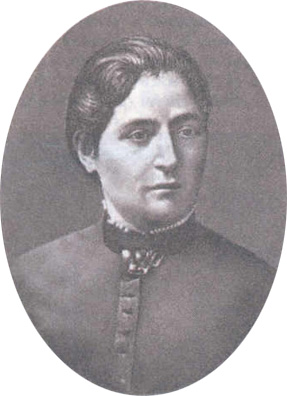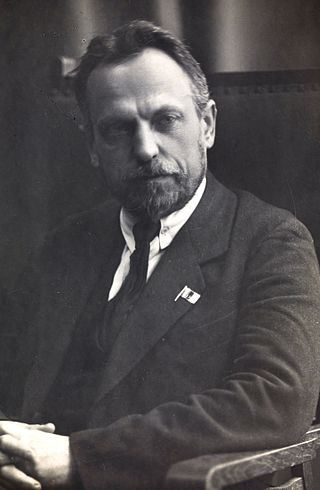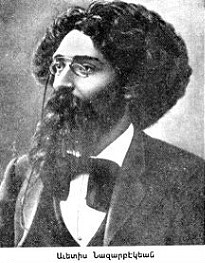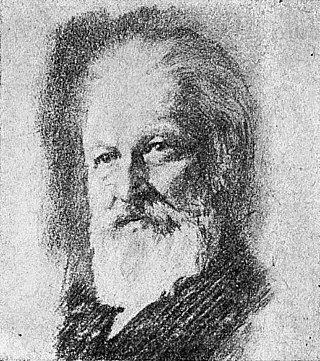
The Bolsheviks were a far-left, revolutionary Marxist faction founded by Vladimir Lenin that split with the Mensheviks from the Marxist Russian Social Democratic Labour Party (RSDLP), a revolutionary socialist political party formed in 1898, at its Second Party Congress in 1903.
Plekhanov is the name of:

Pavel Borisovich Axelrod was an early Russian Marxist revolutionary. Along with Georgi Plekhanov, Vera Zasulich, and Leo Deutsch, he was one of the members of the first organization of Russian Marxists, Emancipation of Labor. After the 2nd Congress of the Russian Social Democratic Labour Party, he was part of the Menshevik faction, with which he was identified until his death.

Lyubov Isaakovna Axelrod was a Russian revolutionary, Marxist philosopher and an art theoretician.
Philosophy in the Soviet Union was officially confined to Marxist–Leninist thinking, which theoretically was the basis of objective and ultimate philosophical truth. During the 1920s and 1930s, other tendencies of Russian thought were repressed. Joseph Stalin enacted a decree in 1931 identifying dialectical materialism with Marxism–Leninism, making it the official philosophy which would be enforced in all communist states and, through the Comintern, in most communist parties. Following the traditional use in the Second International, opponents would be labeled as "revisionists".
Yedinstvo or Edinstvo was a faction within the Russian Social Democratic Labor Party (RSDLP) between 1914 and 1917 and then a small independent party in 1917 and 1918. It was led by Georgi Plekhanov.

Dr. Nikolai Aleksandrovich Semashko, was a revolutionary, Soviet statesman and academic who became People's Commissar of Public Health in 1918, and served in that role until 1930. He was one of the organizers of the health system in the Soviet Union, an academician of the Academy of Medical Sciences (1944) and of the Russian SFSR (1945).

David Riazanov, born David Borisovich Goldendakh, was a Russian revolutionary, historian, bibliographer and archivist. Riazanov founded the Marx–Engels Institute and edited the first large-scale effort to publish the collected works of these two founders of the modern socialist movement. Riazanov was a prominent victim of the Great Terror of the late 1930s.

Alexander Nikolayevich Potresov was a Russian social democratic politician and one of the leaders of the Menshevik faction of the Russian Social Democratic Labour Party. He was one of six original editors of the newspaper Iskra, under the pen name "Starover".
Union of Russian Social-Democrats Abroad was an organization of emigrant Russian socialists, set up in Geneva in 1894 on the initiative of the Emancipation of Labour group. It had its own printing press for issuing revolutionary literature, and published the newspapers Rabotnik and Listok Rabotnika. Initially, the Emancipation of Labour group directed the Union and edited its publications. But afterwards opportunist elements gained the upper hand within the Union.

Avetis Vardan Nazarbekian, also known as Nazarbek or Lerents, was an Armenian poet, journalist, political activist and revolutionary, one of the founders of Social Democrat Hunchakian Party.

Elena Dmitriyevna Stasova was a Russian Soviet revolutionary, Old Bolshevik and an early leader of the organisation that would go on to become the Communist Party of the Soviet Union.
Lenin's Plan of "Monumental Propaganda" – is a strategy proposed by Vladimir Lenin of employing visual monumental art as an important means for propagating revolutionary and communist ideas. "The plan" had the significance of creating a large demand for monumental sculpture on a state level, and thus it stands at the origins of the Soviet school of sculpture. The "plan" consisted of two main projects: (1) – decorating buildings and other surfaces "traditionally used for banners and posters" with revolutionary slogans and memorial relief plaques; (2) – vast erection of "temporary, plaster-cast" monuments in honor of great revolutionary leaders.

Iskra was a political newspaper of Russian socialist emigrants established as the official organ of the Russian Social Democratic Labour Party (RSDLP).

Georgi Valentinovich Plekhanov was a Russian revolutionary, philosopher and Marxist theoretician. He was a founder of the social-democratic movement in Russia and was one of the first Russians to identify himself as "Marxist". Facing political persecution, Plekhanov emigrated to Switzerland in 1880, where he continued in his political activity attempting to overthrow the Tsarist regime in Russia. Plekhanov is known as the "father of Russian Marxism".
Gevorg Harutyuni Gharadjian, also known as S. T. Arkomed, was an Armenian political activist and revolutionary, one of the founders of Social Democrat Hunchakian Party.

The Marx–Engels–Lenin Institute, established in Moscow in 1919 as the Marx–Engels Institute, was a Soviet library and archive attached to the Communist Academy. The institute was later attached to the governing Central Committee of the Communist Party of the Soviet Union and served as a research center and publishing house for officially published works of Marxist thought. From 1956 to 1991, the institute was named the Institute of Marxism–Leninsm (IML).

Mikhail Stepanovich Olminsky was a prominent Russian Bolshevik particularly involved with Party history and also an active literary theorist and publicist.

Isaak Khristoforovich Lalayants was a Russian revolutionary, Marxist, Bolshevik and comrade-in-arms of Vladimir Lenin.

Vladimir Petrovich Makhnovets, also known as Akimovhe, was a leader of the Russian Social-Democrats.














